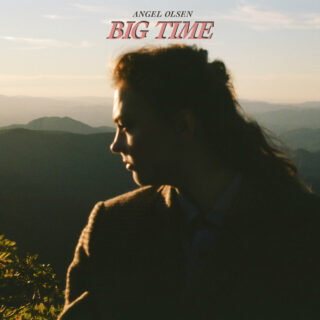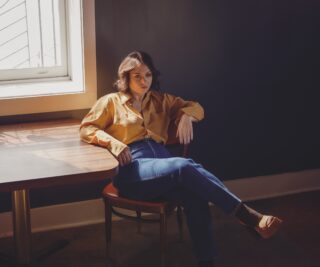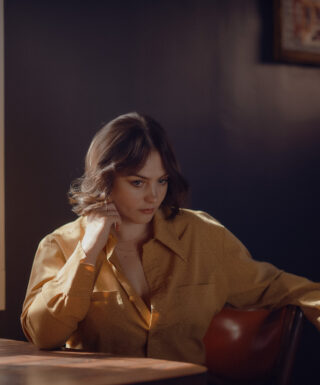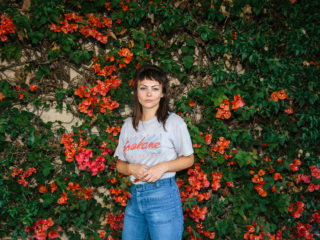
Angel Olsen is a bit groggy. She’s just returned from filming a video for her upcoming single – a trip which in turn came off the back of a mini-tour of North America – and she’s readjusting to being at home. It’s a luxury that she hasn’t been able to indulge in much since shooting to indie fame with her 2014 LP, ‘Burn Your Fire For No Witness’. Despite the effervescent character I’ve seen in past interviews, the first few minutes of our conversation are muted and, for a second, I’m not sure how things are going to go. “I’m lucky if I get seven hours of sleep,” she laments, creaking into action, coffee in hand. “I was making a video in the desert. But I was doing press while I was making the video so I’d get up and do press, then we’d make the video and I’d stay up until three and then I’d get up and do it again.” As she describes the cyclical blur of commitments her voice becomes a drawl, mimicking the abject lack of glamour of the affair. Minor complaint registered, she pauses briefly as though to dust herself off, pick herself up and get into gear. “But it’s all been very exciting. I have a lot of energy!”
And it’s a good thing she does. The breakout success of ‘Burn Your Fire’ saw Olsen and her band clock up nearly a hundred dates in 2014 alone, but after coming home from her last European tour, she was given strict doctor’s orders not to play live for the foreseeable future. Having been sick for two weeks on the road, struggling on a nightly basis to communicate her plight to non-Anglophone audiences, enough was eventually enough. Since then, she has been refining her work-life balance to ensure that she exists in a space somewhere approaching sanity. “I go to therapy, I try to live a healthy life.” Most important of all, however, is her strict detox from music and the music industry. After a string of performances – or birthday parties, as she refers to the self-centred bubble of being on stage – she finds it difficult to go back over it all, or to be around people at all. “You’ve been giving a birthday party every day. And leading a group through that, that sometimes don’t want to be part of the birthday party,” she says with a wry laugh. “When I’m at home I’m not talking about music most of the time. I might be working on music but I’m not going to hang out with my friends and share it with them here. I have a very different personal lifestyle at home. It’s very sacred to me. I don’t really like to perform a lot in this town because I want the privacy and the relaxation.”
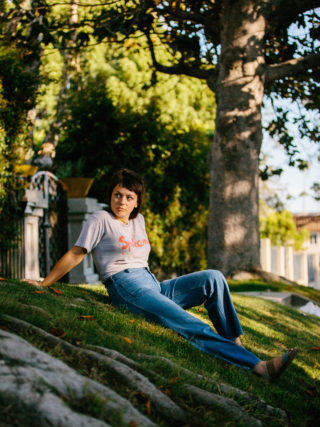
Raised in St. Louis, Missouri, she has made her home in the much smaller city of Asheville, North Carolina, 600 miles south west of where she grew up. With a population of less than 100,000, its chief musical claim to fame is as the home of the Moog Music Corporation, but it’s precisely this lack of pretension that drew Olsen in, and which helps to keep her not only sane but grounded. “It’s a hard place to be famous, unless you’re in an Appalachian folk band or you’re in a hip hop group that’s worldwide successful, it’s kind of a weird place to play. But I like that about it. I like this tiny little place where I’m small.”
Her days in the thick of the Chicago music scene are long gone. With artists at every turn, in every café and every bar, she grew tired of the city’s suffocating force. Yet she still values her relationships with other musicians in helping her deal with fame, even if it is – as she is keen to hammer home – fame on a relatively minor scale. “Talking about the things we go through and how alien and isolating it can be [helps]. People think it’s a blessing – and it is,” she says firmly, careful to impress upon me that she doesn’t take this for granted, “but it is this weird, twisted kind of blessing. You do something well and then you have to talk about it until it gets smaller and smaller and means less and less.”
As well as devising homemade techniques to keep on top of her psychological health, with such a large chunk of her life spent on the road, Olsen has had to adapt her creative approach. The early parts of that sprawling tour were difficult, proving to be barren creative ground as she grappled with the process of writing songs at no fixed abode. “It’s been an adjustment. I wrote some of the songs on side B of this record when I was in Australia. And then I wrote some of the others when I got back from this trip to Istanbul and Greece.” She lights up and her speech quickens as she recalls her most recent excursion. “It was like when The Beatles went to India,” she jokes, “in my head!” Born out of a desire to reconnect as a band and throw off the shackles of their newfound status as colleagues, it turned out to be just the artistic trigger they needed. “My band hasn’t really hung out together as people. We went from friends to business people very quickly and developed habits and wanted space from each other. Back in the day we used to ride bikes to our shitty rehearsal space,” she remembers, drifting off, “before I was getting paid and they were getting paid. Now, seeing the changes, it just felt like we had gone through so much together. So many boundaries have been set up now because I’m a boss, I guess. So we needed to hang out – go to these beautiful places and just hang out.”
The fruits of the resultant burst of inspiration will be released on September 2nd as ‘My Woman.’ A stunning LP of two halves, it is an album made by an obsessive music fan for obsessive music fans. “If you’re a record listener,” says Olsen, delighting in the details of the album, “and you put it on your record player, side A is going to be more upbeat, and then side B is going to be heavy; me hanging out with my band and having a good time.” A labour of love, it captures her group at their telepathic best. Inspired by Fleetwood Mac, producer Justin Raisen encouraged them to record it live from the off in an attempt to maintain the energy of their mesmerising live show. Initially it was a disorientating experience, but as each member recorded in a separate room the chemistry didn’t take long to bubble up. Says Olsen: “We couldn’t see each other and we all had different mixes in our headphones so we were all hearing something else.”
When it came together, it really came together, and as the synergy grew they found themselves enjoying the silences, the perfectly timed gaps in songs as much as the drum fills and guitar lines. “People don’t have to shred all the time,” she asserts, as if I was saying anything to the contrary. “Sometimes what’s wonderful is when people aren’t playing – those moments where the audience has to imagine the note, imagine what happens.” The live nature of the recording also means that not everything is pitch perfect, imbuing the finished article with a human character Olsen holds dear. “Stewart [Bronaugh, guitarist], goes into two guitar solos on ‘Sister’ and on one of them he kind of goes out of tune and loses it a little bit and then he pops back on.” I can almost smell the guitar strings as she gets lost in a list of ‘ands’ with her excitement. “Well, that’s my favourite part of that song!”
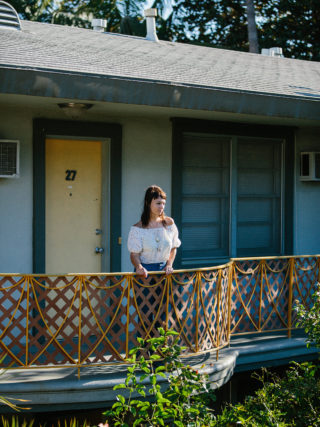
Taking the electric folk baton from ‘Burn Your Fire,’ ‘My Woman’ runs in all manner of new directions. The psych-pop, country and frazzled electric guitars of its predecessors are still present, and the influence of Leonard Cohen, Joni Mitchell and Hank Williams is still felt as keenly as ever, but this time Olsen has made a determined decision to incorporate those sounds and ethics as part of a much wider palette. The modus operandi, you feel, is to emulate rather than imitate this time around. Lead single ‘Intern’ is a solid mark of how far Olsen’s sound has come, and a decent synopsis of the rest of the LP: a dreamy, drumless lullaby shape of decidedly synthetic, rather than acoustic, textures. It could be lifted straight from Four-Calendar Café-era Cocteau Twins.
And while it would be easy to cast the album as a sonic volte face – Olsen’s equivalent of Dylan going electric, or Radiohead’s much-exaggerated ditching of the guitars on ‘Kid A’ – it is more subtle than that. Marrying ’50s rock and roll and late ’70s punk to gothic keyboards and sequenced drums, ‘My Woman’ sounds like it is from the present rather than the past as Olsen eschews purely traditional instrumentation for a perfect blend of digital and analogue. “I didn’t want to make a piano album,” she says assuredly. Instead, she has come to find synth, organ and Mellotron much more flattering to the voice than the piano’s colder sounds. “With piano it’s like playing drums and singing and juggling and you have rhythms happening on two hands and then you have the rhythm of your voice. It’s kind of like a maths problem to me, but I needed something new. I like playing the grunge stuff and I like playing the pop stuff and that’ll always be a part of me but I wanted to embrace this.” The only problem, she says, is that because she was having so much fun with her new approach the songs just grew and grew, to the point where she was seriously toying with the idea of a double album. Rock music’s most overblown of statements, it didn’t happen – and she’s coy when I suggest we might get another album in quick succession. “I had this dry spell for a really long time. I’m writing again, so we’ll see.”
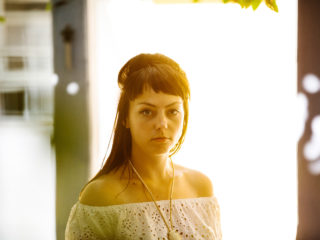
As well as the undoubted stylistic development, ‘My Woman’ is notable for the sheer number of sounds Olsen manages to craft from her own vocal chords. She seems to be able to move between voices with ease, literally from one track to the next. The sweet ’60s girl group delivery on ‘Sister,’ for example, segues impossibly with ‘Woman’ and the sound of a female who has lived, loved, lost and everything in between, belying Olsen’s 29 years. It’s a product, she says, of sheer impatience. “I remember recording as a kid and wondering when I would get an adult’s voice. I was like, ‘This is boring, I have a kid’s voice.’” She should smoke and drink more, I tell her, and she’ll get that late Dylan gravel before she’s 30. “Yeah, and I’m sure my balls will drop eventually and then I’ll sound like a man and I’ll be so psyched. The seventh album will be called ‘My Man’ and it will be the most literal record ever released.”
I’m keen to understand how she develops such disparate timbres and intensities but she’s self-effacing, and puts up a wall before she reveals the magic recipe. “Well, I get out of practice a lot of the time. When I get back from a long tour sometimes I don’t even want to sing for a month or so – like, I don’t want to hear my own voice because I’ve sung Hi-Five too many times. I don’t want to hear it, I don’t want to see it, I don’t want to know it; I don’t want anyone to high five me any more.”
But as she gears up to do it all over again and take the latest creation to her public, she’s ready to go. “I end up pushing myself in my live performance,” she says, and I know she isn’t lying. “I learned this over the last couple of years. I like the records I’ve made, and ‘Burn Your Fire’ was definitely a turning point, but when I listen to it – and I don’t listen to it – but if I heard it on the radio or something, it’s kind of weird and alien because the versions have gotten better to me in a live setting with a bigger band.”
Far from braggadocio, these are the words of a woman who has firmly found her feet and isn’t afraid to say so. And with an album as solid as ‘My Woman’ up her sleeve, why would she be? “We do a live version of [three-minute acoustic number] ‘Acrobat,’” she gushes, and it’s clear that the old enthusiasm has returned. “It’s seven minutes long and it’s real laid back and stone-y – very different from the record. I’m looking forward to that!”
It’s time to go, and I get the sense that Angel Olsen could chat for several more hours, long past any appointments she or her management might have made as she ruminates on Dolly Parton, the confusing role of Twitter in a musician’s life and the poor state of music journalism today. But we’ll save that for next time. “I really appreciate you taking the time,” she says politely, “to ask me about my birthday party.”




